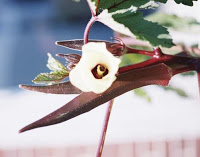African American chefs, food historians, and heritage gardeners have long extolled the importance of understanding not only where the foods one purchases today come from, but also the culinary history of African Americans. It is a rich history shaped by place of origin, travails of enslavement, and cultivating the soils in the new land.
George Washington Carver, agronomist and scientist, laid the groundwork allowing today’s food historians and chefs to embrace and share this rich food heritage. Carver was an early promoter of helping black farmers better understand their land and crops to give them greater economic power, knowledge, and control of their resources.
 |
| Burgundy okra |
Edna Lewis was a seminal figure in the food landscape of the 20th century. She was a ground breaker as a female chef, a black female chef no less, as she fed New Yorkers simple, elegant Southern cooking. Her legacy is the creation of the Edna Lewis Foundation dedicated to “honor, cultivate, and preserve, the rich African-American culinary history by offering a variety of events and programs designed to educate, inspire, entertain, and promote a deeper understanding of Southern culinary culture and heritage.” And as importantly, to educate, train, and mentor young African American chefs.
There currently are a number of black chefs whose restaurants and books have made an impact on American food enthusiasts. These include Marcus Samuelsson in New York; Wayne Johnson and Daisley Gordon in Seattle. There have been awards and ceremonies celebrating black chefs, including black chefs of the White House.
And last, but not least, there is you, dear reader. If guidance and inspiration is needed, check out Black America Cooks for ideas about cookbooks celebrating African American cooking, dishes new to you, and what other food enthusiasts are thinking about. And, if you want to go back to primary sources, here is a link to a discussion of the first African American Cookbook (1866!) by Mrs. Malinda Russell. Fifteen years after Mrs. Russell published her book, Mrs. Abby Fisher, an ex-slave, published “What Mrs. Fisher Knows About Southern Cooking”. She subsequently started a catering business in San Francisco. Have any family stories about particular recipes, food events, vegetable gardening?…..post a comment!
